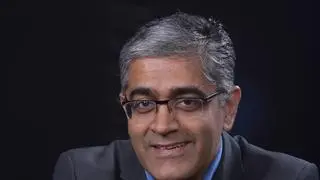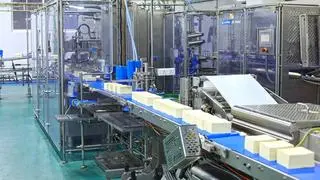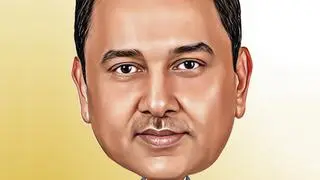It’s a blazing summer day; a battery of workers is involved in assembling cars at the factory of a large automobile manufacturer near Chennai undeterred by the heat as each chassis proceeds at a slow pace on the conveyor. While the men on the assembly line are hard at work, another batch of workers are like busy bees, feeding the assembly line with components just in time; some operating forklifts which bring windshields for the cars or tyres, at different sections of the conveyor. Another set of workers is focused on supporting the line assembly for the roof, putting the wiring in place before placing the roof padding. Work is going on seamlessly.
The second set of workers who are providing the support services as well as house-keeping services are part of UDS — Updater Services Ltd — among India’s largest facilities management companies, and one of the companies working with this auto maker since 1998. While the picture that comes to mind of facilities management are services such as housekeeping, landscaping, gardening, security et al — which UDS also does — this over 30-year-old company has scaled up the value chain to provide sophisticated engineering support services for auto manufacturers to even airports, where it handles maintenance of generators, transformers, UPS, chillers, HVAC and more. UDS manages a clutch of airports from Bengaluru T2, Mangaluru, Guwahati, Goa Mopa airport and Delhi international airport, among others.
At the auto factory, for instance, UDS employs over 900 people who provide various support services. Says Saravanan CR, Chief Operating Officer, “We are part and parcel of this auto maker’s operations. Our 900-plus employees are responsible for every operation, including line support operations. Also, there are 12 different support companies of theirs which supply critical parts; UDS provides people support for them also.” In short, it’s the MMM, as Sarvanan says — men, machines and materials that UDS provides.
UDS was founded by Raghunandana Tangirala in the early ’90s when facilities management was in its infancy. The big inflection point came in the late 1990s-early 2000s when software companies started putting up huge campuses and offices and needed support services. “Expectations changed and it redefined the way office complexes were maintained. We initially started off with cleaning, catering, electrical work. Then from there we moved to all services and then to manufacturing, engineering services where we built capabilities. We have a 30-day training capsule on site for the people who join,” he explains. UDS employees range from unskilled, semi-skilled to highly skilled; the entire pyramid is covered, it says.
As Saravanan explains, UDS offers ‘soft’ services and ‘hard’ services. Soft is housekeeping, facade cleaning, landscaping et al while ‘hard’ would be mechanical to electrical support services. “We have an umbrella of companies in the group and provide most services under one roof; like UDS provides housekeeping services we have a company for food & beverages; one for specialised hospitality, for washroom hygiene, a company for supplying housekeeping materials; this is unique about UDS as a group. Competition may have more numbers, but providing every service under one roof is unique to us.” The support services are varied, he emphasises – from providing the entire team of nurses to a hospital in Ahmedabad to back-end services for the Statue of Unity in Gujarat – from ticketing to crowd management.
Today, close to 35 per cent of UDS’ revenues come from the manufacturing industry while 60 per cent is from supporting IT, pharma, ITeS, BFSI industries. UDS supports over 40 industries ranging from railways and Metros to oil and gas companies to hospitals, employing over 50,000 people. It is the backbone of many companies, working silently in the background, if you will. Competition is from a variety of players offering full services like UDS, such as Quess, SIS and others like ISS and Sodexo and a plethora of smaller players.
UDS got listed in October 2023 in a price band of ₹280-300, scaling a highest price of ₹380 and a lowest of around ₹260. In FY24, its revenues were up to ₹2,456 crore, up 16 per cent while reported PAT was up to ₹66.3 crore, up 91per cent.
Strategic Support
By 2010, Raghunandana says the margins for facilities management companies dropped with international players coming in. Worldwide, he says, it’s a 4-5 per cent margin game. “In the last 5-6 years I wanted to build a business services platform by moving into other businesses. The ground rule was to be a B2B, services business, scalable and with higher margins. We are the most profitable in facilities management as we have acquired a clutch of companies in various businesses.” Matrix, a business assurance service provider for various industries including FMCG and retail, for instance, is a 20 per cent margin business. “Today, I can market a bouquet of services to clients — from background verification to food (see box),” he adds.
UDS’ business services give it a 12-13 per cent margin; UDS remains at 4-5 per cent, while blended will be around 7 per cent. Around 60 per cent of its profits come from business services and the rest from UDS. In terms of revenues, it’s the other way around. “We will continue to grow in this manner. Most companies are wholly-owned subsidiaries of UDS,” he adds.
COO Saravanan says that the key challenge faced by it and the industry is availability of trained resources with the increasing alternative employment opportunities available in the country. “Deployment of technology including robotics and digitalising the services will help to reduce the growing resource shortages,” he adds.
PC Balasubramanian, one of the key founding members of Matrix, who sold to UDS, and is now a group advisor, says, “We have a fabulous set of highly experienced managerial talent with deep domain knowledge and expertise who have been with us for many years and that’s key for our line of business. We strongly believe that we can now offer multiple services to most of our customers as we have a large bouquet of offerings from every company in the group and that’s going to a huge win-win.”
P Padmakumar, Executive Director, HR, Saint-Gobain India, says the glass maker was fortunate to have UDS as one of its business partners. As Saint-Gobain grew its manufacturing footprint in various geographical areas, UDS was a natural choice. “The framework of this partnership can be summarized as 3 ‘C’ — competency, continuous improvement and credible leadership. This partnership journey is now two decades and counting, where both organisations have reported growth not less than 7x times,” he says.
Raghunandana says he has an expansive vision for the group. He says that the big vision is “to provide a compelling business services platform to our customers and be an essential partner by delivering differentiated services and to be the most trusted partner to all out stakeholders.”











Comments
Comments have to be in English, and in full sentences. They cannot be abusive or personal. Please abide by our community guidelines for posting your comments.
We have migrated to a new commenting platform. If you are already a registered user of TheHindu Businessline and logged in, you may continue to engage with our articles. If you do not have an account please register and login to post comments. Users can access their older comments by logging into their accounts on Vuukle.